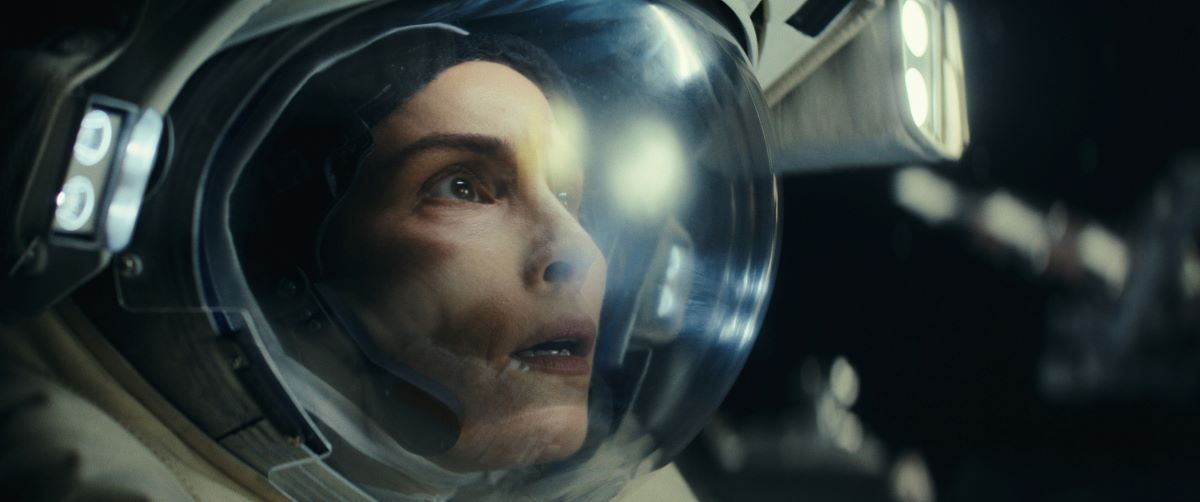Noomi Rapace must find something comforting about space. In 2012’s “Prometheus,” she was face-to-face with some of the most frightening creatures ever devised. Her new Apple TV+ series, “Constellation,” once again puts her into orbit with a nightmare equally as frightening. Engaging in an experiment aboard the ISS, Jo (Rapace) and her crew are hit with space debris, triggering a fire and the need for an immediate evacuation. After her death-defying return to Earth, she finds that her reality is not how she remembered it.
An original script from creator and writer Peter Harness (“Jonathan Strange & Mr. Norrell,” “Doctor Who”), “Constellation” is an exploration into the psychology of astronauts and secrets in space travel. Harness quite literally uses space as a launching pad for the series and then takes off in another direction. Audiences expecting some kind of space exploration series will be disappointed to discover that it’s window-dressing for a psychological drama. It’s a shame because “Constellation” is a lot more compelling when its characters are in death-defying situations rather than the conspiracy-filled trappings it falls into.

The first three episodes (which premiere together) find Jo fighting insurmountable odds to get back to Earth to see her husband Magnus (James D’Arcy) and their daughter Alice (Davina and Rosie Coleman). The accident aboard the space station cost the life of commander Paul Lancaster (William Catlett) and the remaining crew quickly escaped in one of the emergency vessels. That leaves Jo with the difficult mission of preparing the last emergency vessel on her own, while her remaining oxygen quickly depletes. Meanwhile, the dutiful husband and daughter await news on Jo.
D’Arcy is excellent here as his character comes across as a sniveling, miserable partner who is unsure whether he truly wants his spouse to return from space. Mostly he desires Jo’s return so that their daughter Alice will have her mother again. Alice experiences similar reality-altering events that trouble her mother, giving some credence to the strange occurrences. It’s an impressive performance from the actresses, struggling with grief and questioning their reality. Eventually, Jo and Alice share screen time and it’s there that “Constellation” is at its most compelling. It’s easy to accept that a mother would do anything to return to her child. Witnessing the horror on Rapace’s face as she wrestles with a daughter that she doesn’t remember is heartbreaking. And watching Alice discover that her mother might be gone despite standing in front of her is equally distressing.
One character at odds with the mission is Commander Henry Caldera (Jonathan Banks). Above the safety of the astronauts, he’s obsessed with the retrieval of the experiment that might have influenced the trouble on the ISS. Banks, having shown his quietly menacing demeanor throughout his career on shows like “Breaking Bad,” is the ideal actor for this calculating character. Like some of the other dual roles in “Constellation,” he gets to play double duty as Bud Caldera, an astronaut whose life trajectory altered significantly after a controversial space mission. The first introduction to this doppelganger reveals he’s an old curmudgeon working the convention circuit. A much different status than his counterpart Henry.

These early episodes are easily the most thrilling part of the series, with an emergency crash landing from a failed space shuttle sharing a lot of DNA with 2013’s “Gravity.” From there, “Constellation” struggles to maintain its momentum. As a thrilling space adventure, it fails to deliver constantly engaging threads to follow. Of course, the Russians have space secrets. Why should we care about this mysterious MacGuffin that has Banks’ character so preoccupied? And let’s not even get started about the convenience of a working Fisher Price cassette player that ends up being a key element of the series. The plot contrivances do “Constellation” no favors.
Much like Jo’s constant questioning of her reality, “Constellation” frequently alters viewpoints and timelines to suit its narrative too. It’s disorienting and designed to put audiences in a state of confusion like its protagonist. After all, most of the series hinges on Jo’s mental acuity. One frequently used gimmick of “Constellation” is that a character will see an event transpire in front of them and then that scene will be revisited with an alternate perspective. The intent is there, but the payoff never justifies the means. When used sparingly these alternating perspectives can illuminate certain scenes; when the series uses it as a crutch, the disorienting nature of the story loses some of its charm. It’s fine for the characters to be lost within the story, but there needs to be something that grounds the events.
Fans of the many quality science-fiction offerings on Apple TV+ will likely be satisfied by “Constellation.” It’s an interesting space drama with standout performances from its cast. While Rapace and Banks were expected to be the main draw of this series, and they’re excellent, the performances from Davina and Rosie Coleman are the glue that holds it together. But despite these moving performances, “Constellation” spends too much time floating aimlessly. The show likes to believe it’s clever, but the reality is that it often falls flat.
“Constellation” premieres on Apple TV+ with the first three episodes on February 21st. Entire season screened for review.











